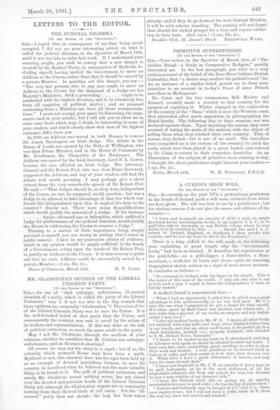LETTERS TO THE EDITOR.
THE JUDICIAL DILEMMA.
[To THE EDITOR OF THE „SPECTATOR."] Sin, I regret that, in consequence of my time being much occupied, I did not see your interesting article on what is called the judicial dilemma, in the Spectator of March 14th, until it was too late to write last week. If I understand your meaning aright, you wish to convey that a new danger is created by the Radical Party, in consequence of Radicals, in- cluding myself, having invited the Government to move an Address to the Crown, rather than that it should be moved by a private Member. In pointing out this danger, you say :— 4‘ The very last persons who in any case ought to move an Address to the Crown for the dismissal of a Judge are her Majesty's Ministers. Such a proceeding ought to be conducted with the highest decorum, and to be absolutely free from all suspicion of political motive ; and no proposal • emanating from a Ministry can have all those recommenda- tions." I must not occupy your space by discussing the argu- ments used in your article ; but I will ask you to allow me to state some facts which may, I think, be interesting to some of your readers, and which clearly show that men of the highest eminence differ from you.
In 1830, an Address was moved in both Houses to remove Sir Jonah Barrington, an Irish Judge. The debate in the House of Lords was opened by the Duke of Wellington, who was then Prime Minister, and in the House of Commons by Mr. Goulbourn, the Chancellor of the Exchequer. The Address was moved by the Irish Secretary, Lord F. L. Gower, because the case affected an Irish Judge. The Attorney- General and Sir Robert Peel, who was then Home Secretary, supported the Address, and any of your readers will find the debate well worth perusing. I may perhaps give a short extract from the very remarkable speech of Sir Robert Peel. He said :—" That Judges should be, as they were, independent of the Crown, no one, he supposed, would question; but was a .Judge to be allowed to take advantage of that law which con- ferred this independence upon him to neglect his duty to the country P Surely not. There were many disqualifications which would justify the removal of a Judge. If for instance Again, advanced age or infirmities, which unfitted a Judge for performance of the judicial function, would justify 'the House in addressing the Crown to remove a Judge."
Turning to a matter of little importance, being simply personal to myself, you are wrong in stating that I acted on public rumour. I have in my possession plenty of evidence, which in my opinion would be amply sufficient in the hands of a Government, acting upon the words of Sir Robert Peel, to justify an Address to the Crown. It is unnecessary to point out that no such Address could be successfully moved by a private Member.—I am, Sir, &c., House of Commons, March 24th. H. P. COBB.


































 Previous page
Previous page